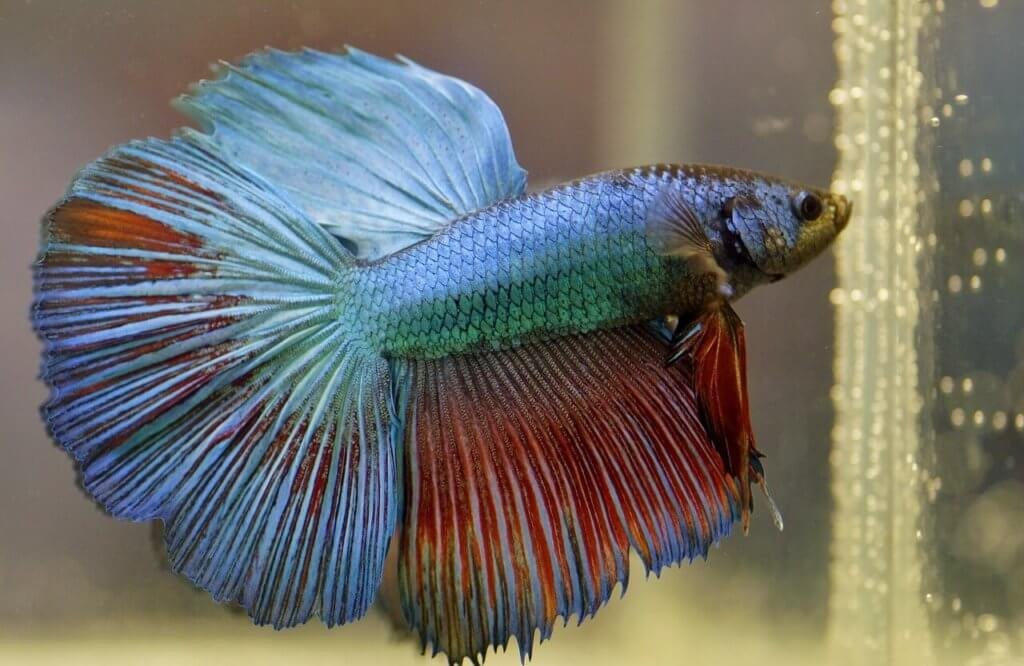When it comes to the ideal betta fish tank size, there are various factors to consider. However, as a starting point, a 5-gallon tank is generally recommended as the minimum size for a single fish. That being said, if possible, a larger tank is always preferable.
Common Misconceptions About Betta Fish Tank Sizes
There are numerous myths and misunderstandings surrounding the appropriate tank sizes for betta fish.
These misconceptions stem from various sources:
Aquarium Shops: Many betta fish are kept in small containers in aquarium shops to prevent fighting among specimens. However, it’s important to note that this is only a temporary solution and can impact the fish’s lifespan.
It’s crucial to understand that betta fish thrive better in more spacious and enriched environments.
Natural Habitat: Betta fish are naturally found in rice paddies and swamps in Southeast Asia. While they can survive in shallow waters, it’s essential to provide them with a more stimulating and suitable tank setup for optimal health and well-being.
In the aquarium hobby, some misconceptions about betta fish preferences have led to inadequate tank conditions.
Hobbyists: Betta fish enjoy having hiding spots and enrichment in their environment. Placing them in bare tanks can lead to stress and limited activity.
Contrary to some beliefs, betta fish actually benefit from larger tank sizes that allow for natural behavior and exploration.
In this article, we will debunk these misconceptions and delve into the ideal tank size for betta fish.


Factors Influencing Betta Fish Tank Sizes
To determine the optimal betta fish tank size, several factors should be taken into account:
Water Chemistry
Maintaining proper water chemistry is crucial for the health of your betta fish. Smaller tanks can experience faster fluctuations in toxic substances, emphasizing the importance of adequate tank size for water quality.
A larger tank reduces the need for frequent water changes and promotes a more stable environment for your betta fish.
Filtration
Effective filtration is essential for maintaining water quality. Larger tanks offer more filtration options and can accommodate filters without causing strong currents that may distress betta fish.
Heating
Betta fish require warm water to thrive, making aquarium heaters necessary. Larger tanks provide more space for heaters and offer better heat retention, ensuring stable temperatures for your fish.
Aquarium Shape
Bettas extract oxygen from water through their gills. Tanks with larger surface areas allow better oxygen absorption, promoting a healthier environment for your fish.
Tank Mates
While bettas are territorial, they can coexist with suitable tank mates. Larger tanks are required for community setups to provide ample space for all inhabitants.
Conclusion
In summary, it is recommended to keep betta fish in a tank no smaller than 5 gallons, with larger tanks being preferable if feasible.


Choosing the Right Tank for Your Betta Fish
Selecting an appropriate betta fish tank involves considering key factors:
Large Surface Area
Tanks with more horizontal space allow for better oxygenation, benefiting your fish’s health.
Secure Lid
Prevent betta fish from jumping out of the tank by using a snug-fitting lid.
Equipment Space
Ensure your tank has ample room for essential equipment such as filters and heaters.
Built-in Features
Consider tanks with integrated filtration and heating systems for convenience and efficiency.

